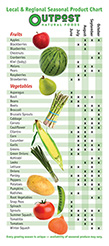Rice Sources
Sourcing Rice
Rice is a pretty important staple for many people and it occupies a large place in our diets – as well as in our bulk food department. It’s no surprise that we get frequent questions from customers about where our rice comes from. Here is the latest rundown. We’ll update this if vendors change.
The bulk bins indicate the country of origin where each variety of our rice is grown.
All rice varieties are grown in the US except for these options below:
• Our wild rice comes from either Canada or the US – it depends upon season and pricing.

• Madagascar pink rice grown in Madagascar
• Volcano rice grown in Java, Indonesia
• Black forbidden rice, grown in China (fair trade; organic when available and transitional when the seasonal organic supply diminishes)
• Bhutanese red rice grown in Bhutan (fair trade; organic when available and transitional when the seasonal organic supply diminishes)
• White and brown jasmine rice, fair trade and organic, grown in Cambodia
Both the Madagascar Pink and Volcano rice varieties are certified organic and fair trade and grown using a revived traditional method of cultivation that preserves water resources. The rice is not grown in flooded paddies. The method is called “SRI” and because the rice is not sitting in water, it absorbs fewer contaminants than rice grown in paddies.
The fair trade Madagascar pink, Volcano, black forbidden, red, white and brown rice varieties are imported by Lotus Foods, a company of great integrity that is dedicated to reinvigorating traditional cultivation methods, fair labor practices and improved conditions for small scale growers, and is dedicated to organics and assisting growers in converting to organic methods. The company tests every container of rice it purchases for contaminants, including pesticide residues, arsenic and heavy metals. The company states that due to the remote areas most of its growers are in, the small scale nature of much of the cultivation and the methods used (organic, transitional organic and SRI) Lotus has never had a reason to reject rice because of contamination. If the rice is found to be contaminated when test, Lotus will not sell it.
More information on Lotus Foods’ policies can be found here and here. 
The organic Jade pearl rice they provide at present is cultivated in the USA.
The only imported packaged rice Outpost sells is from Alter Eco’s fair trade rice. Alter Eco’s mission and integrity is similar to that of Lotus Foods. The company also tests each batch for contaminants and says it won’t sell a contaminated product. Specific Information on arsenic levels in Alter Eco’s rice can be found here and here.








